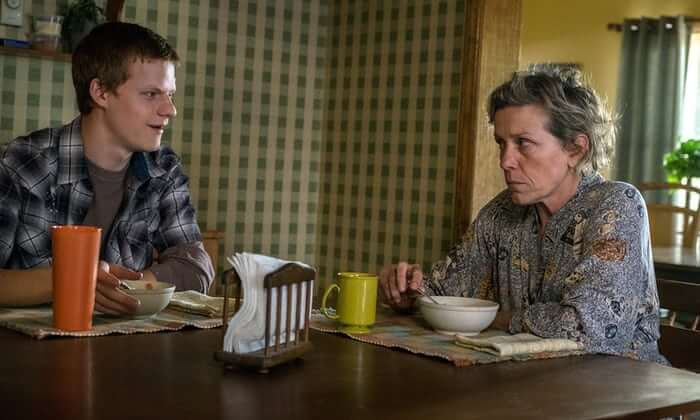-
Critics Rating - 8/108/10
Three Billboards outside Ebbing Missouri is a riveting tragedy. The Director here, Martin McDonagh, is in no hurry to give you the answers to the complex questions the film raises nor does he intend to deliver a taut thriller. Instead we get a riveting case study of various human psyches that change courses when pushed against the wall. The screenplay is punctuated by the rawest human emotions like, Grief, Shame, Guilt and Redemption. How these emotions are maneuvered through a seemingly slow paced drama, is masterful.

The very first frame, we are shown the Three Billboards, covered in a cloud of fog. They are torn, broken, and worn-out and quite evidently have remained unused for ages. A car passes by on the Billboards road, it stops and we see Mildred in the car. She looks at the Billboards for a few seconds, chews into her finger nail and drives away. She makes a decision, we are not told what it is, nor does she utter a word but you know that it was something strong. A character defining moment usually occurs halfway through the film, but when you find the very first scene to be character defining, you know that you are witnessing an actor revel in the depths of her craft, you know that you are witnessing an Oscar winning performance, you know it is Frances McDormand.

Mildred, played by McDormand, is a grief- stricken mother of a Murdered daughter. She carries a stoic expression through the film, yet, never making it a one note performance, she ties a bandana on her head, as if a rebel, which she is. The only time we see her hair let loose and beautiful is in the one scene in the flashback, the difference is vivid, and the face has wrinkled badly as life has gifted hardships in the form of a murdered daughter and an abusive husband. But she doesn’t seek sympathy, what she seeks is definitive answers and in the quest for those answers, she hires The Three Billboards and writes the following. Raped while dying. And still no arrests. How come, Chief Willoughby?
The film transcends into greatness the moment it humanizes the character of the Chief Willoughby and does not resort to stereotypical treatment of a Policeman being questioned by public. He has his own demons to fight. The screenplay is delightfully dense as it realizes all the characters completely and leaves no unattended detail of the principal characters. A classic example for the aforementioned character development is, the role of an obnoxious, racist cop, Dixon, played by an unforgettable Sam Rockwell who leaves an indelible feeling of melancholy over the last act of the film. His character is not written for mere social commentary on racists but has a well etched out arc that propels the narrative and the way he handles the graph is incredible. The scenes between him and his mother are pure gold.

Three Billboards outside Ebbing Missouri is a film full of heft, humor, fully realized characters and some heart wrenching moments. The scene in which Mildred, sitting under the Billboards, talks to a deer that visits her, is particularly tear-jerking. Another of the biggest strengths of the film is its unpredictability. You would not know how a usual interrogation scene might end, the screenplay brims with original ideas and the execution is precise and poignant. The Director employs beautifully detailed framework to paint our minds with the feeling he intends to evoke. Take the shot where we see Mildred running from one burning Billboard to the other, trying desperately, to set off the fire. We see, in a wide shot, Mildred in the middle of two Billboards, running, seeing the sheer distance she needs to cover to reach the other billboard to set the fire off, is heartbreaking.
In a film that excels at so many facets, Frances McDormand towers over everything else. The scene in which she delivers a monologue to a Church Father, asking him to mind his own business, is a testament to the untamed talent of an acting beast that she possesses. “The Chick ain’t losing this time” as she says in a scene, she surely ain’t. Long after I left the theater, I walked in the trance of a magical bubble this film created. Things only cinema could do.
You may also like: Phantom Thread Review- A tale woven through deeper than times!
It is Dense, Devastating and Disturbing. Just the sight of The Three Billboards, in red, with those words written on them, shall remain one of the most iconic moments of cinema.
Three Cheers to Three Billboards outside Ebbing Missouri.















You can not find a better review for a heart breaking film.